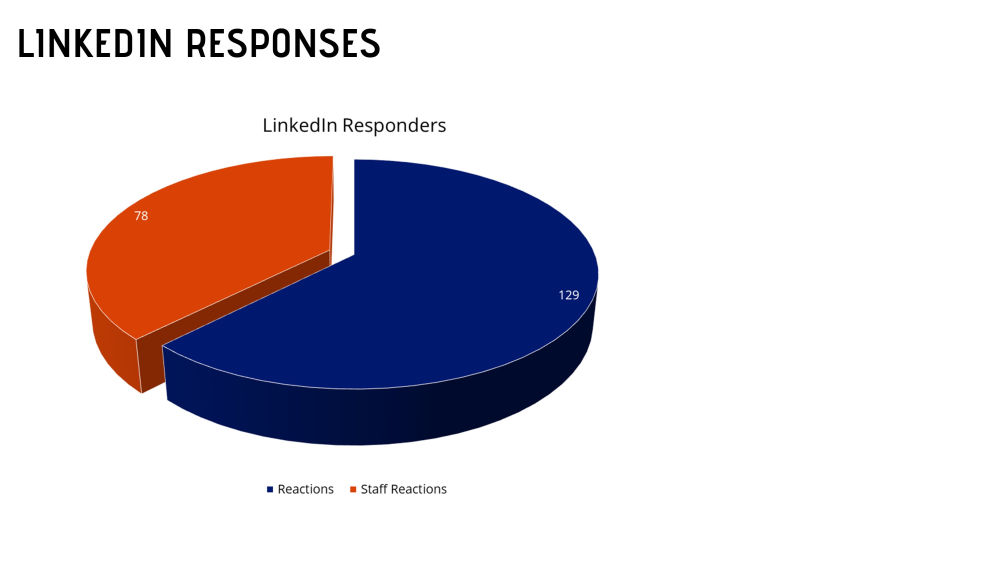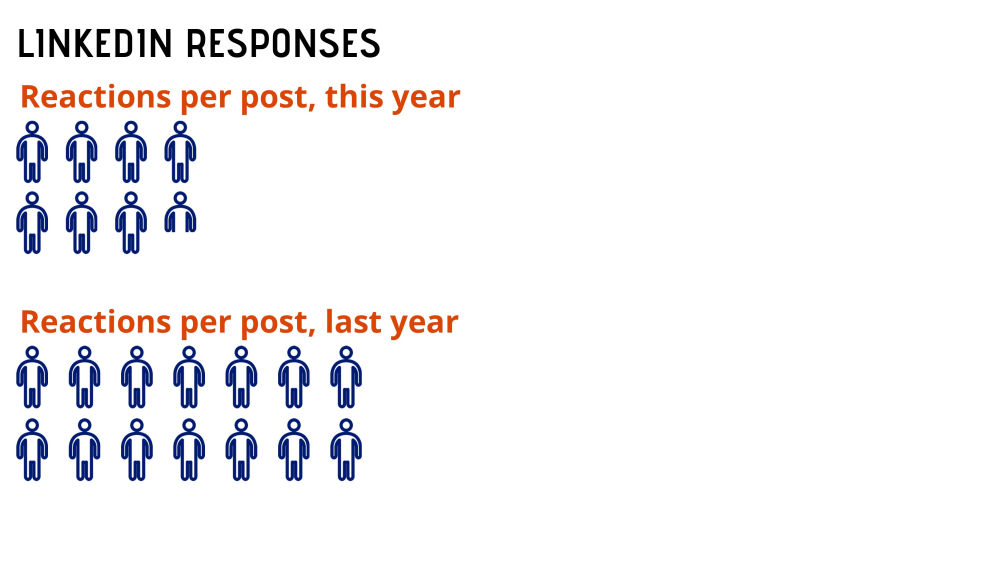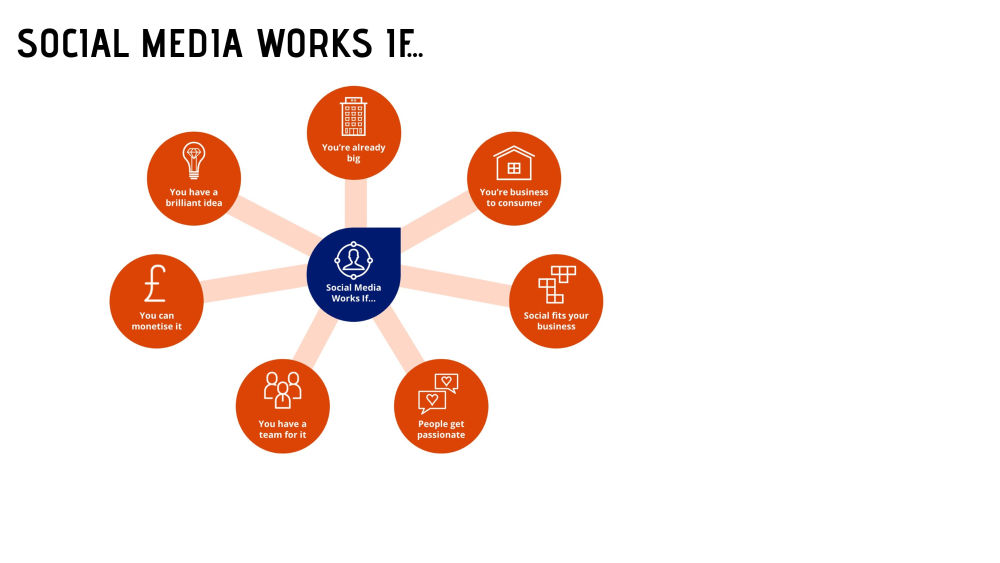Marketing Troubleshooter 004
Welcome to the latest episode of the Marketing Troubleshooter.
This time we’re talking about an on-site power provider who wants to know how to get their social media working for them.
The Brief
Here’s an extract of the brief (we’re splitting this one up into smaller segments):
We’re a small, well-established business employing about 40 people. We’re totally business-to-business – we don’t sell any hardware that would be relevant or affordable for consumers.
…
We post regularly on LinkedIn. We use a lot of video. And although we’ve invested a lot of time and a fair amount of money into the project, we’re not sure how to tell if it’s successful.
What’s our next step?
The Outline
So, the social media challenges they have to face are:
- Few followers.
- Low interaction.
The solutions we’ll be discussing include:
- When social media works.
- Who it works for.
- Why it’s not going to work in this instance.
This is where we diverge from our normal case study approach because we’re going to talk about what NOT to do. This plan won’t work. And sometimes in business it’s as important to decide NOT to do things so you can concentrate on better things.
Social media will never be a success for you. Let’s define success broadly: you get more out of it than you put in.
The most important way to measure that would be money. Specifically profit.
- It would be relatively easy to measure the money you put into your social media activities. Cost the time your staff put into it and the amount you pay your social media agency.
- It’s not so easy to measure the financial benefits but I think you already have a pretty good feel for that already.
We certainly won’t define success as the number of followers or likes you get. You can’t take them to the bank.
Current Performance
Let’s look at how and why social media isn’t working for you. Firstly, what is your performance?
- Last month you made 17 posts on LinkedIn. That’s the right platform for you and 17 posts is considered good by advocates who value quantity. It’s nearly one post per working day.
- From those 17 posts you got 207 reactions (likes, etc.). That sounds good. But it’s actually only an average of 12 reactions per post. That’s not so great.
- But it gets worse. You’ve got your staff well organised to respond to posts to bump up their visibility. The downside of that is that we have to ignore 78 of your reactions because they come from your own people. Your average post gets just under 8 ‘external’ reactions.

- And then it gets a bit worse still because, when you look at who’s reacting to your posts, it’s the same people over and over again. Social media isn’t exposing your brand to new customers. And that’s one of the main reasons to do it.
- But advocates always say social media is a long-term strategy. It takes time to build an audience. So is your channel getting better? No. You get nearly 8 reactions per post this year. For the same month last year you were getting nearly 14. It’s getting worse, not better.

- It’s getting worse over time, not better
- One bright spot is that you also got 747 click-throughs from those 17 posts. But unlike other reactions, you can’t tell who click-throughs come from.
And there’s another problem with links. All the links on your posts seem to go the same place: your home page. If a visitor clicks a link in a post about Product X, they want to go to a page about Product X. They don’t want to be dumped on the home page and left to find Product X.
So are we really saying that, contrary to all the prevailing marketing advice, social media is a bust?
Social media works when…
No, but there seem to be some very specific circumstances when it can work.
Let’s deal with them in turn:
- Social media can work if you’re already a big name. It’s no surprise that Apple, Nike and the utility companies have big followings. That’s not you.
- Social media can work if you’re business-to-consumer. Most social media platforms support our personal lives not our business lives. That doesn’t fit your products.
- Social media can work if it fits the business. A direct-to-consumer business that maintains all of its customer relationships online suits social media. I’ve had conversations with a lady who delivers art training courses online. Social’s perfect for that. It’s visual and it supplements remote learning. Mark Ritson’s mini-MBA is similar. But that’s not you.
- Social media can work if people can get passionate or enthusiastic about your product/service. If it’s something related to tech, hobbies – sport, music, cinema, even politics. But that’s not you.
- Social media can work if you have a team to generate and manage content. Look at On The Tools. Great success. But they’re a video production company with teams dedicated to social media. That’s not you.
- Social media can work if you have a clear way to monetise what you’re doing. Can you sell your products/services through social media? You can’t.
- Social media can work if you have a slam dunk idea. If Harry Dry launched Marketing Examples in Ancient Egypt and published them on papyrus scrolls it would still be a success because it’s a great idea. The fact that uses social media is not a testament to the power of social media. It’s a testament to the power of what he’s communicating. It’s also worth noting he’s driving people towards his email mailing list. That’s not you.
So that’s when social media can work. If you’re looking for reasons why you shouldn’t focus on social media, well, if you don’t fall into any of those categories you have seven very good reasons not to put too much work into it.
A golden rule of business
And there’s another golden rule of business to consider: don’t build on somebody else’s foundations. That applies to your communications strategy as much as anything else.
That’s what you’re doing if you rely on social media. The platforms could change completely and scupper your communications strategy.
Look at them this way:
- There’s continuing negative press about their impact on society and mental health.
- There’s continuing negative press about their interference in political life.
- There’s continuing negative press about their inability to police hate speech.
- There’s continuing negative press about their lack of fact-checking.
- There’s continuing negative press about their deliberate, accidental or careless inaccuracy of metrics and advertising bills.
- They’re subject to the platform owners own actions that drive users away e.g. too much advertising; or flooding you with content that’s irrelevant and annoying.
- There’s a chance of government intervention like TikTok almost getting banned in America.
- There’s a likelihood of user apathy with particular platforms; they’re subject to what’s fashionable today.
All this means audience participation and activity could drop off enormously. As you can do nothing at all about it. You have no control over it. If you base your communication strategy on this type of media you’re asking to be kicked in the face. If you base communications on your own website and your own mailing list you retain control.
If you don’t believe me, listen to Daniel Rowles and Ciaran Rogers of the wonderful Digital Marketing podcast. On December 7th…
- Daniel said (and this is a direct quote): “The problem is, whenever you have a community on a social platform you are limited by the social platform changing things. In LinkedIn you used to be able to message everyone in your group. They changed that. You lose control of your own audience a little bit. So we’re going to go back to email.”
- And Ciaran followed up with “I have this theory that email is one of the best social channels going if it’s done right. What’s lovely about email as a channel is that you own. It’s not owned by some billionaire in California.”
Proximity To Profit
Does this mean everyone should stop doing social media? No.
Remember Proximity To Profit. To judge the priority of competing activities, assess:
- How much profit could it generate?
- How likely is it to generate that profit?
- How soon will it generate that profit?
- How difficult will it be to generate that profit?
That’ll lead you to a mixed strategy like ours. Most of our marketing is long-term brand building and Account-Based Marketing. Social’s part of that mix. But a small part.
Build it and they won’t come
So, that may not be the answer you were looking for but it’s an incredibly common problem. It does nobody any good to keep on repeating the same old mantras. “Build it and they will come” may have worked for Kevin Costner, but it won’t work for you.



